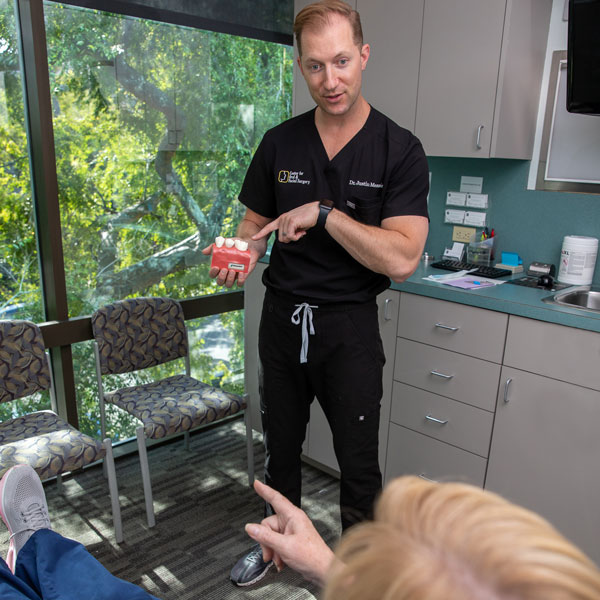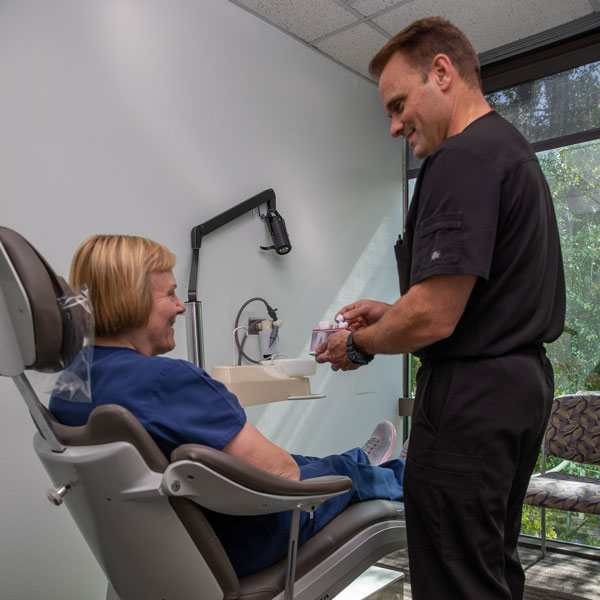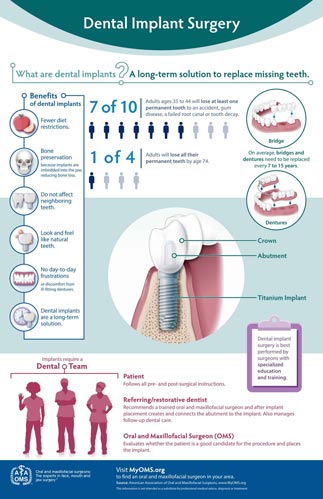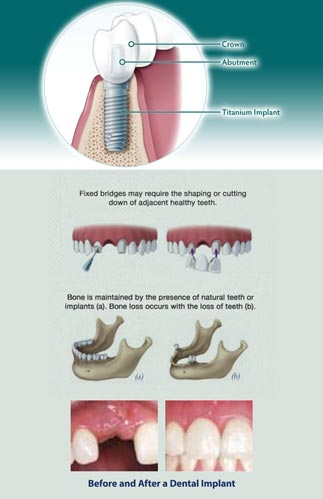Dental Implants
About Dental Implants
Dental implants are changing the way people live. They are designed to provide a foundation for replacement teeth that look, feel, and function like natural teeth. With a dental implant, you will be able to eat virtually anything. Replacing missing teeth with dental implants preserve and restore youthful facial contours. Patients with dental implants can smile with confidence.

What Are Dental Implants?
The dental implants themselves are tiny titanium posts that are surgically placed into the bone where teeth are missing. These metal anchors act as tooth root substitutes. The bone bonds with the titanium, creating a strong foundation for artificial teeth. Abutments, that look like small posts, then allow artificial teeth to be attached to the implant.
Implants also help preserve facial structure, preventing bone deterioration that occurs when teeth are missing.
Dental Implants Can Last a Lifetime
Dental Implants vs. Bridges
The Surgical Procedure
For most patients, the placement of dental implants involves only one surgical procedure.
If you are having an extraction, the tooth is removed, and the implant is placed into the socket during the same procedure. A healing abutment is placed to contour the gum tissue for tooth restoration. The implant can heal approximately in 6 weeks, at which time you will return to the office for a quick evaluation and clearance to proceed with the restorative phase. Most often, we do not ever need to “numb up” after your initial surgery!
When front teeth are involved, temporaries must be fabricated to assist with the obvious social issues. Each case will be evaluated for the most appropriate choice.
At times, patients may have poor quality bone or insufficient volume of bone. In these cases, the surgeon may elect to allow the implant to heal beneath the surface of the gum for additional protection. After the implant has bonded to the bone, the second phase begins. Dr. Eckstein, Dr. Oleksy, Dr. Havas and Dr. Taylor will uncover the implant and attach a small healing cap that protrudes through the gums. This will help shape the gingiva, resulting in a more cosmetic result. The restorative phase then begins.
When the artificial teeth are placed, the implant components will not be seen. Most patients experience minimal disruption in their daily life. In most cases, patients can easily return to work the following day. Postoperative discomfort is considered minimal.

Surgical Advances
To provide you with a better understanding of dental implants, we have provided the following multimedia presentation. Many common questions pertaining to dental implants are discussed.
Using the most recent advances in dental implant technology, Dr. Eckstein, Dr. Oleksy, Dr. Havas and Dr. Taylor can place single-stage implants. These implants do not require a second procedure to uncover them but do require a minimum of six weeks of healing time before artificial teeth are placed. Most often, implants can be placed at the same time as a tooth extraction – further minimizing the number of surgical procedures.
Dental implant placement is a team effort between an oral and maxillofacial surgeon and a restorative dentist. While Dr. Eckstein, Dr. Oleksy, Dr. Havas and Dr. Taylor perform the actual implant surgery, extractions, and bone grafting, if necessary while the restorative dentist (your dentist) fits and makes the permanent prosthesis.
Frequently Asked Questions
What type of prosthesis are available?
A single prosthesis (crown) is used to replace one missing tooth – each prosthetic tooth attaches to its own implant. A bridge can replace three or more teeth and may require only two or three implants. A complete dental prosthesis replaces all the teeth in your upper or lower jaw. The number of implants varies depending upon which type of complete prosthesis (removable or fixed) is recommended. A removable prosthesis (over denture) attaches to a locator abutment. Think of a locator abutment as a ball shaped trailer hitch. A fixed prosthesis is permanent and removable only by the dentist.
Dr. Eckstein, Dr. Oleksy, Dr. Havas and Dr. Taylor perform in-office implant surgery in a hospital-style operating suite, thus optimizing the level of sterility. Inpatient hospital implant surgery is for patients who have special medical or anesthetic needs or for those who need extensive bone grafting from the jaw, hip, or tibia.
Why dental implants?
Once you learn about dental implants, you finally realize there is a way to improve your life. When you lose several teeth – whether it’s a new situation or something you have lived with for years – chances are you have never become fully accustomed to losing such a vital part of yourself.
Dental implants can be your doorway to renewed self-confidence and peace of mind.
A Swedish scientist and orthopedic surgeon, Dr. Per-Ingvar Branemark, developed this concept for oral rehabilitation more than 35 years ago. With his pioneering research, Dr. Branemark opened the door to a lifetime of renewed comfort and self-confidence for millions of individuals facing the frustration and embarrassment of tooth loss.
Why select dental implants over more traditional types of restorations?
There are several very strong reasons! Why sacrifice the healthy structure of surrounding good teeth to bridge a space? This tooth supported bridge is reduced in function and has a limited lifespan. Why suffer the maladies of antiquated removable partial dentures? In addition, not only is removing a “partial” at night inconvenient, they are poorly functional and rather embarrassing when they slip and fall out.
Are you a candidate for implants?
If you are considering implants, your mouth must be examined thoroughly, and your medical and dental history reviewed. If your mouth is not ideal for implants, ways of improving outcomes, such as bone grafting, may be recommended.
What type of anesthesia is used?
Most dental implants and bone grafts can be performed in the office with local anesthesia with or without nitrous oxide or IV sedation. Most patients elect IV sedation because of the comfort and peace of mind.
Do implants need special care?
Once the implants are in place, they will serve you well for a lifetime if you take care of them and keep your mouth healthy. This means taking the time for good oral hygiene (brushing and flossing) and keeping regular appointments with your dental specialists. Other healthcare issues will be addressed if indicated to maximize the lifespan and success.


